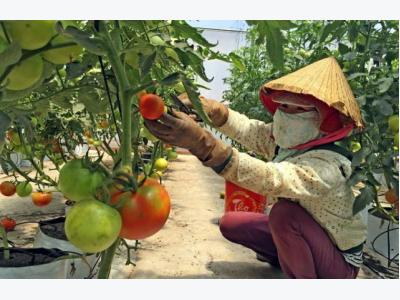Farming start-ups need more help

A farmer harvests tomatoes planted in a greenhouse in Central Highlands Lâm Đồng Province’s Đơn Dương District. Pragmatic policies are thought to be needed for the Government to realise its goal of promoting start-ups in the agriculture sector.— VNA/VNS Photo Nguyễn Dũng
HÀ NỘI – Pragmatic policies are needed for the Government to realise its goal of promoting start-ups in the agriculture sector.
During an online discussion held by the Government portal on Friday afternoon, Đậu Anh Tuấn, head of Việt Nam Chamber of Commerce and Industry’s Legal Affairs Department, said that the Government should consider lifting the land limit which was hampering successful agricultural business.
“Successful agricultural businesses require large-scale production,” he said. “Collecting products from multiple sources makes it difficult to ensure stable quality, trace origins and to guarantee the food safety”.
The Law on Land introduced in 2013 set the land limit for agriculture by individuals or households from two to three hectares and from 10 to 30 hectares for industrial plants like rubber, coffee beans or tea trees.
“Such land limits increase production costs and erode motivation to expand business,” he said.
The Ministry of Agriculture and Rural Development (MoARD) was considering loosening agricultural land limits, which was a positive signal, Tuấn said, hoping that it was a step towards complete elimination.
He also suggested that the Government discard so-called production quotas. Citing examples of production quotas the MoARD set for tra fish (catfish) and lobster in 2020 – which are hoped to reach some 1.9 million and 1,940 tonnes respectively, Tuấn believed what the Government was doing was market intervention.
“The Government is amending the Law on Planning and I hope that the regulations regarding production planning will be tossed out. The Government should only do macro-planning and let the market decide product supply”.
A report titled “Enabling the Business for Agriculture” from the World Bank last year ranked Việt Nam’s agricultural business environment in the lower half of Southeast Asia. The country was positioned only above Laos, Cambodia and Myanmar.
Plant businesses in Việt Nam scored 62.5 points on the scale from a possible 100, lower than Cambodia’s 68.8 and Bangladesh’s 70.8, while the country ranked 37th out of 40 countries in the report for the business environment for agricultural machinery with 24.4 points.
The financial market for agriculture, meanwhile, was considered average with 45.3 points.
Former Science and Technology Minister Trần Quốc Thắng agreed one of the key challenges for agricultural start-ups was accessing capital.
“There is currently a shortage of investors and venture capital funds to provide finance for start-ups,” he said. “In the long-term, the Government should set up venture capital funds and credit guarantee funds”.
How to do high-tech?
What the Government was encouraging was start-ups based on creativity and high-tech application, in which connectivity between those having business ideas and those having necessary technology played a vital role for successful start-ups, Thắng said.
The Government, in this regard, should lay out an even playing field for the three parties involved.
“They are the Government with business policies, the start-ups and the science players like researchers, institutes and universities. The connectivity between them creates what we call the start-up eco-system,” he said.
“If that national eco-system of creativity is established and develops, high-tech agriculture businesses will prosper”.
Start-up company Hoa Anh Đào’s Management Board Chair Trần Lệ agreed, noting that some business ideologies failed to understand the real meaning of high-tech business and were threatening the environment.
He cited the increase of plastic film made-greenhouses in Lâm Đồng Province’s Đà Lạt City which was dubbed an agricultural high-tech city.
The film is a cheap way to build greenhouses, which led to mass construction of such greenhouses in Đà Lạt. Yet it resulted in a loss of rainwater absorbed in surface soil and to nearby streams and rivers.
“High-tech agriculture was not supposed to be like that. It should be innovative and not affect the environment,” he said.
“By and large, the definition of high-tech agriculture in Việt Nam is still understood very vaguely”
Có thể bạn quan tâm
 Price of Vietnamese fruit exports on upward trend
Price of Vietnamese fruit exports on upward trend The Ministry of Agriculture and Rural Development said that prices of fruits have risen due to buoyant market demand.
 Farmers in Mekong delta chop down sugar-cane because of low price
Farmers in Mekong delta chop down sugar-cane because of low price Lately, sugar-cane farmers in the Mekong delta have chopped down sugar-cane trees because of low price.
 Bac Giang builds over 20 net houses growing vegetables and flowers
Bac Giang builds over 20 net houses growing vegetables and flowers To date, 21 models of net and membrane houses have been built with a total scale of 52,119 square meters across the districts and city in the northern province
 Coffee export volumes jump, value falls in Q1
Coffee export volumes jump, value falls in Q1 Việt Nam exported 520,000 tonnes of coffee worth US$1 billion in the first quarter of the year, an increase of 15.1 per cent in volume but a decrease of 1.7 %
 Sustainable agriculture project raises farmers’ profits by 14 per cent
Sustainable agriculture project raises farmers’ profits by 14 per cent The Việt Nam-Sustainable Agriculture Transformation Project (VnSAT) in the Mekong Delta has helped raise farm profits by 14 per cent after two years